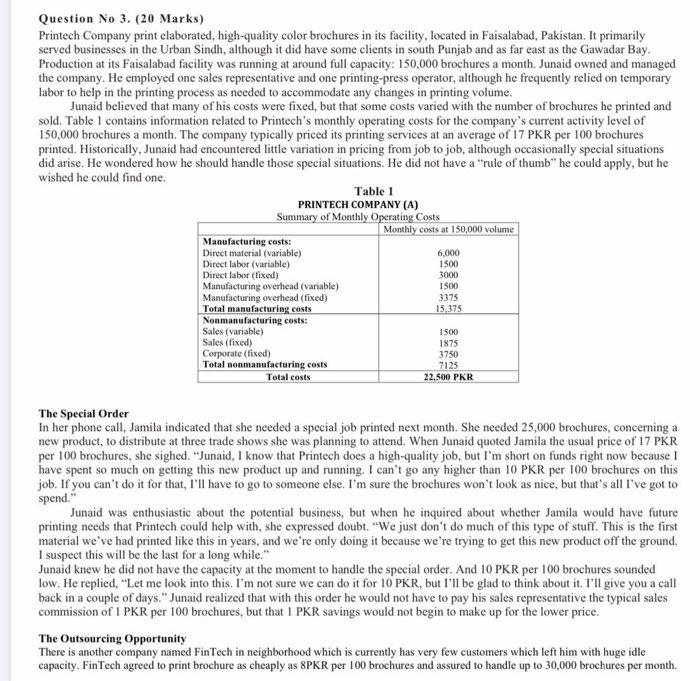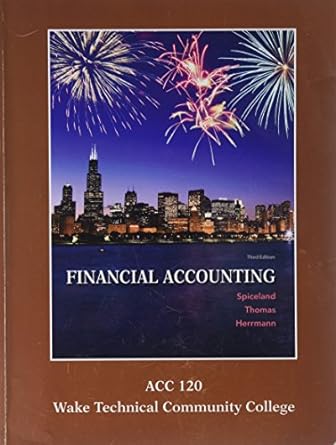Question No 3. (20 Marks) Printech Company print elaborated, high-quality color brochures in its facility, located in Faisalabad, Pakistan. It primarily served businesses in the Urban Sindh, although it did have some clients in south Punjab and as far east as the Gawadar Bay. Production at its Faisalabad facility was running at around full capacity: 150,000 brochures a month. Junaid owned and managed the company. He employed one sales representative and one printing-press operator, although he frequently relied on temporary labor to help in the printing process as needed to accommodate any changes in printing volume. Junaid believed that many of his costs were fixed, but that some costs varied with the number of brochures he printed and sold. Table I contains information related to Printech's monthly operating costs for the company's current activity level of 150,000 brochures a month. The company typically priced its printing services at an average of 17 PKR per 100 brochures printed. Historically, Junaid had encountered little variation in pricing from job to job, although occasionally special situations did arise. He wondered how he should handle those special situations. He did not have a "rule of thumb he could apply, but he wished he could find one. Table 1 PRINTECH COMPANY (A) Summary of Monthly Operating Costs Monthly costs at 150,000 volume Manufacturing costs: Direct material (variable) 6,000 Direct labor (variable) 1500 Direct labor (fixed) 3000 Manufacturing overhead (variable) 1500 Manufacturing overhead (fixed) Total manufacturing costs Nonmanufacturing costs: Sales (variable) Sales (fixed) Corporate (fixed) 3750 Total nonmanufacturing costs Total costs 3375 15,375 1500 1875 7125 22,500 PKR The Special Order In her phone call, Jamila indicated that she needed a special job printed next month. She needed 25,000 brochures, concerning a new product, to distribute at three trade shows she was planning to attend. When Junaid quoted Jamila the usual price of 17 PKR per 100 brochures, she sighed. Junaid, I know that Printech does a high-quality job, but I'm short on funds right now because I have spent so much on getting this new product up and running. I can't go any higher than 10 PKR per 100 brochures on this job. If you can't do it for that, I'll have to go to someone else. I'm sure the brochures won't look as nice, but that's all I've got to spend." Junaid was enthusiastic about the potential business, but when he inquired about whether Jamila would have future printing needs that Printech could help with, she expressed doubt. "We just don't do much of this type of stuff. This is the first material we've had printed like this in years, and we're only doing it because we're trying to get this new product off the ground. I suspect this will be the last for a long while." Junaid knew he did not have the capacity at the moment to handle the special order. And 10 PKR per 100 brochures sounded low. He replied, Let me look into this. I'm not sure we can do it for 10 PKR, but I'll be glad to think about it. I'll give you a call back in a couple of days." Junaid realized that with this order he would not have to pay his sales representative the typical sales commission of 1 PKR per 100 brochures, but that 1 PKR savings would not begin to make up for the lower price. The Outsourcing Opportunity There is another company named FinTech in neighborhood which is currently has very few customers which left him with huge idle capacity. FinTech agreed to print brochure as cheaply as 8PKR per 100 brochures and assured to handle up to 30,000 brochures per month. 5. Are there any ethical issues that Printech must consider before accepting such special order? 6. How will the workforce react to the Printech decision to accept or reject such special orders? 7. How will the existing customers respond to the Printech decision to accept or reject such special orders? 8. Should Printech outsource 30,000 brochures to FinTech? 9. what could be issues in outsources








